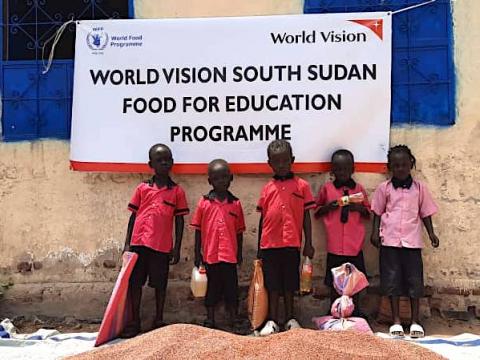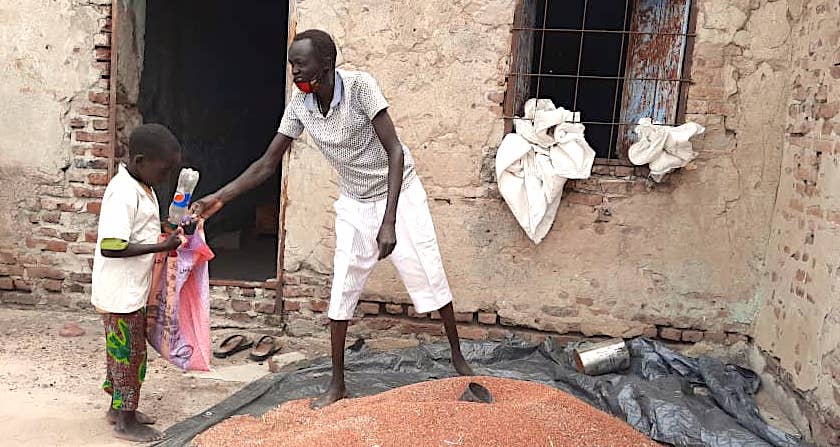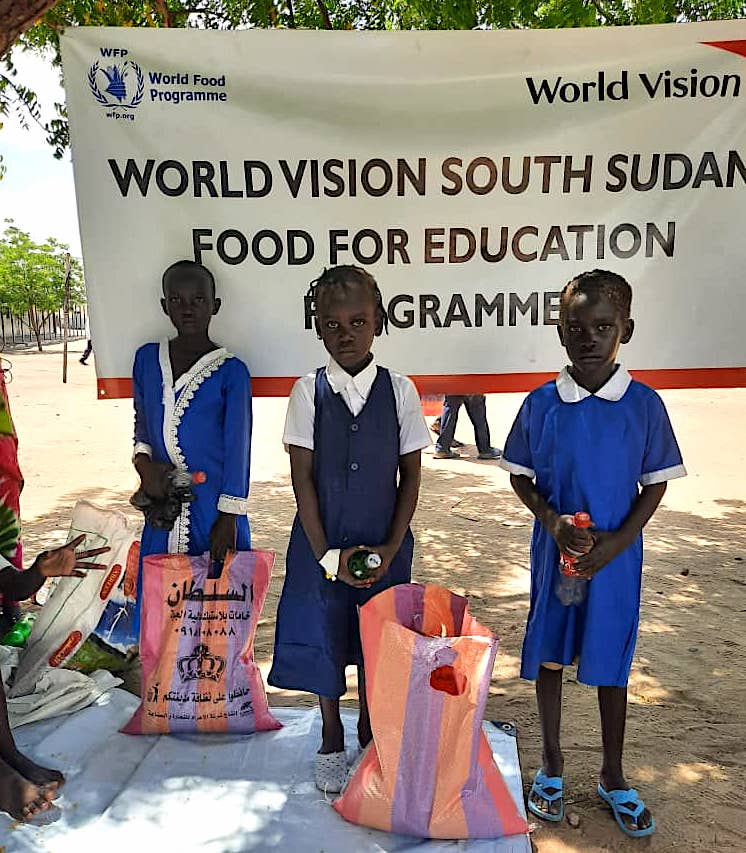World Vision and WFP distribute 149MT take-home food ration to over 19K schoolchildren in South Sudan

Amid closure of schools due to COVID-19, World Vision and the World Food Programme (WFP) have distributed 149.079 metric tons of take-home food ration in lieu of school feeding programs to 19,980 children in South Sudan’s Western Equatoria and the Upper Nile States.
World Vision’s partnership with WFP introduced hot meals to school children to improve the general pupils’ attendance and retention in schools. This helped boost the food access to 183,000 children, improved their nutrition needs, and encouraged them to study.
Sunday Betping a pupil of Comboni Primary School shares, “Before Covid-19, I used to eat lunch from the school feeding program, then it stopped when the school closed. My family can only afford one meal per day. I am excited that because of the take-home ration, we can eat full meal every day. I pray that schools open soon so we can resume our disrupted learning.”
Related Story: 1.9 million children despair over schools closure

“Adequate nutrition is essential for schoolchildren’s health and well-being. Many of the children who missed the feeding program could potentially develop nutrient deficiency and become vulnerable to infections. These children from vulnerable households depend heavily on such programs that contribute significantly to their daily nutrient requirements”, says World Vision’s Operations Director Madeleine Bilonda.
According to a report from UNESCO's Global Initiative on Out of School Children South Sudan, an estimated 2.4 million children are out of school. It warns that the number will increase to 2.6 million if conditions in the country do not significantly improve, the study.
Adequate nutrition is essential for schoolchildren’s health and well-being. Many of the children who missed the feeding program could potentially develop nutrient deficiency and become vulnerable to infections.
“The take-home rations initiative assures children daily meals for the next three months. It will keep them well-nourished, and help them avoid risks and danger since they do not have to venture outside to look for food especially on this lean agriculture season”, says Inos Mugabe, World Vision’s Program Manager in Upper Nile Zone.
The years of conflict, displacement, and economic collapse and now Covid-19 has deprived children of proper education, putting the generation’s future at risk. In Western Equatoria, food insecurity has continued to worsen due to the conflict. In some counties, the insecurity continues to prevent many from accessing their farms affecting their sources of livelihood.
Video: COVID-19 stops schools and feeding programs

Food insecurity also prevents children from learning well and they end up dropping out from going to school because of an empty stomach. Sixty-year-old Mary Waure is a single mother and breadwinner of 16, of which 12 are school-going children. She lives in the Yambio-Napere area with a population of 8,000 people.
Mary says, “Even though I am working as a registered nurse, looking after 16 people has not been easy for me. My monthly salary of SSP5,000 (US$30) cannot support a family’s needs for a month. She added that the take-home food ration can sustain them for three months until the restrictions are lifted."
Mary’s 16-year-old daughter Ngbarago Dita Daniel is thankful of the timely intervention. “We cannot afford to buy rice and beans. With assistance, we have food at home reducing our risk of starving during this COVID-19 Pandemic. My only worry now is when will we go back to school. We have no idea when will this pandemic ends.”
“COVID -19 is evolving rapidly and it is difficult to predict how long school closures will last. Adapting this initiative is a relief that we can support children eat nutritious food, keep them healthy while participating in home schooling and radio school program”, Bilonda concludes.
Related Story: Girls fear early marriage due to COVID-19

Video: Why education is important for South Sudanese children?
Story by Scovia Faida Charles Duku, Communications Coordinator I Photos by Jok Aleer, Food Monitor and Victor Diko, Monitoring & Evaluation Officer